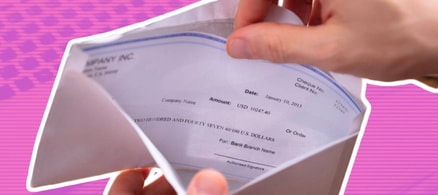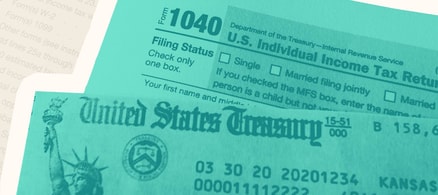When do I need to report Venmo, Zelle and cash app payments on my tax return?
You’ll only receive 1099-Ks from Venmo or similar cash apps if your goods and services earnings exceed $600. But there’s an important caveat here. Even if you’ve earned less than $600 through a particular platform, the IRS still requires you to report that amount on your tax return.
So, let’s say you accept $450 in goods and services payments through Venmo. While you won’t receive a 1099-K from Venmo, you’ll still need to include the $450 as earned income on Schedule C (1040) when you file your taxes. Not reporting earned income to the IRS could result in some unfortunate consequences, including audits and tax penalties.
While Zelle works similarly to Venmo, Zelle’s payment network is structured differently and isn’t subject to IRS 1099-K reporting requirements. Unlike Venmo and other payment processors where you can hold a balance in the app, Zelle facilitates bank transfers and you can’t retain a balance on its platform.
Of course, just because Zelle won’t be sending you a 1099-K it doesn’t mean the payments you receive from that service aren’t reportable to the IRS. (More on this shortly.)
Meet Your Retirement Goals Effortlessly
The road to retirement may seem long, but with WiserAdvisor, you can find a trusted partner to guide you every step of the way
WiserAdvisor matches you with vetted financial advisors that offer personalized advice to help you to make the right choices, invest wisely, and secure the retirement you've always dreamed of. Start planning early, and get your retirement mapped out today.
Get StartedWhat payments do I not need to report on my tax returns?
Chances are you’ve probably used Venmo or another cash app to split a bill at a restaurant or pay a friend or family member for another expense.
Fortunately, the new tax rules don’t apply to personal payments made through third-party processors, so you can continue to divvy up restaurant expenses and accept payments from family and friends without worrying about unexpected Venmo taxes. This is true even if total personal payments exceed $600.
How do I avoid taxes on cash apps?
But there’s one important thing to note: To avoid a Venmo tax, ensure your personal payments are being classified properly. If payments from family members or friends are accidentally being made as goods and services payments, you could end up with an unexpected 1099-K and run into problems at tax time next year.
The best way to avoid this scenario is to separate your personal and business payments. Consider creating one account for personal and one for business purposes to keep things separate.
Unfortunately, there’s no way to avoid taxes on goods and services payments you’ve received through third-party payment processors, Zelle included. Per IRS rules, you’ll need to include those earnings as part of your total taxable income. The same goes for any business earnings you receive through bank transfers, checks, cash or other means of payment. If you have questions about taxes on your earnings, consider speaking with a tax professional for guidance.
Stop overpaying for home insurance
Home insurance is an essential expense – one that can often be pricey. You can lower your monthly recurring expenses by finding a more economical alternative for home insurance.
SmartFinancial can help you do just that. SmartFinancial’s online marketplace of vetted home insurance providers allows you to quickly shop around for rates from the country’s top insurance companies, and ensure you’re paying the lowest price possible for your home insurance.
Explore better ratesWhat’s a Form 1099-K?
A ‘1099-K, Payment Card and Third Party Network Transactions’ form, or 1099-K for short, is a tax form used to report business earnings paid through third-party payment platforms or via credit or debit cards. Companies like Venmo, Cash App, Etsy and PayPal are required to send these forms to the IRS when goods and services payments to an individual exceed $600 for the tax year
You should receive a copy of any 1099-K forms third-party payment platforms send to the IRS on your behalf, and you’ll need to report payment amounts on your taxes.
What to do if I don’t receive a 1099-K?
You may not receive a 1099-K for the tax year if your total business payments through a third-party payment network don’t exceed $600. But if your payments cross that $600 threshold and you still don’t receive a 1099-K from a particular platform, it’s best to contact that company for further guidance. Also, be aware that some companies may send these forms digitally, so if you don’t receive a paper form in the mail, check your account or your email for notifications.
Per the IRS, these forms are generally distributed by January 31 for payments received in the prior year, so you should, in theory, receive all your 1099-Ks by early-to-mid February.
What happens after I provide my tax info?
As part of the recent reporting changes, third-party payment platforms may request that you confirm your name and contact information and provide your Social Security number (SSN) or Individual Tax Identification Number (ITIN).
Confirming this information is correct will help ensure you receive an accurate tax form and avoid any unexpected issues with future payments or backup tax withholdings. Basically, it’ll make things easier for you, the payment processor issuing the 1099-K, and the IRS.
What if I don’t provide my tax info?
If you don’t provide your tax information to the processing platforms through which you receive payments, there could be some unfortunate consequences, including backup tax withholdings for future payments.
For instance, Venmo issues tax holds and 24% tax withholdings on goods and services payments apply if you’ve exceeded the $600 earning threshold and haven’t yet provided your tax information. The 24% withholding goes directly to the IRS and helps ensure you’re paying them any income taxes you owe.
Sharing your tax information proactively can help you avoid this hassle and stay on the IRS’s good side.
The bottom line
If you’re self-employed or have a side hustle, you can probably expect more tax forms next year. Or you may have already received multiple 1099-Ks if you received more than $600 through a particular platform and live in Maryland, Massachusetts, Vermont or Virginia.
Despite the extra forms, tax filing may actually be simpler because the 1099-Ks will offer a clear picture of your actual goods and services earnings. You won’t need to worry about poring over your accounting software or tracking spreadsheets to add up your payments. To simplify things at tax time, consider getting help from a reputable tax software or financial professional.
Sponsored
Follow These Steps if you Want to Retire Early
Secure your financial future with a tailored plan to maximize investments, navigate taxes, and retire comfortably.
Zoe Financial is an online platform that can match you with a network of vetted fiduciary advisors who are evaluated based on their credentials, education, experience, and pricing. The best part? - there is no fee to find an advisor.







